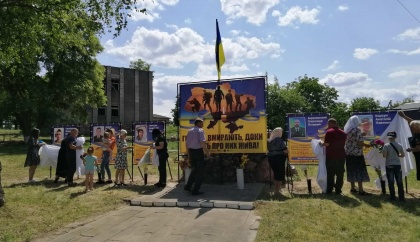
Back in the early 80s, the community of Pokaliv asked the authorities to erect a monument to their fellow villagers who died during the Second World War. Instead, the government imposed on them a monument to the “first Bolsheviks,” which depicted a burly man in a fur coat, a karakul hat, and a huge flag in his hands.
Reprinted from the Sheriffs for New Communities Information Platform.
“I was born in the village and lived here all my life. No one ever really knew to whom that monument was dedicated – it simply was there," recalls Yuliya Davydiuk, moderator of the Docudays UA Film Club at the Pokaliv Lyceum.
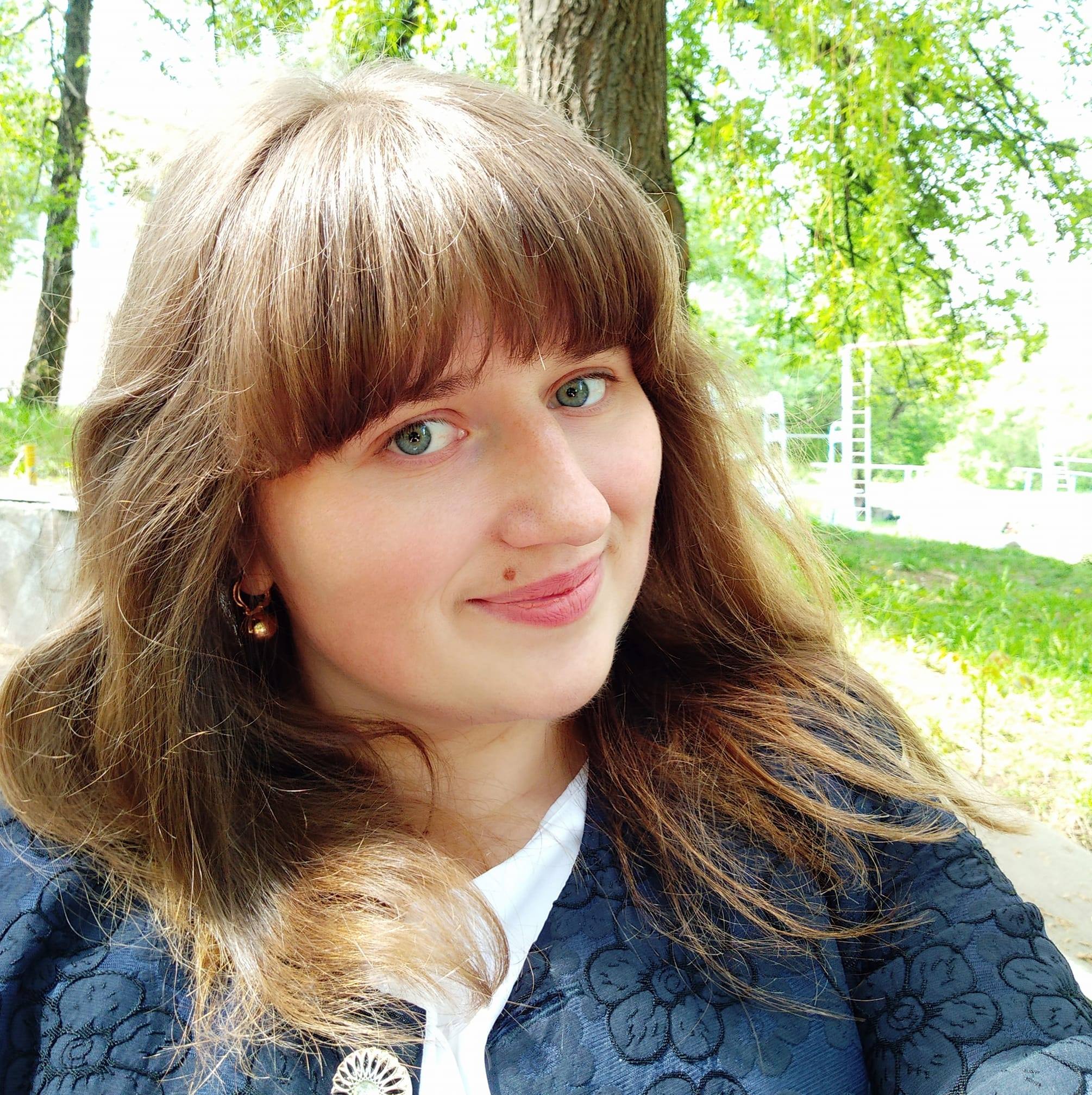
Yuliya Davydiuk
How the film club decommunized the monument to the “first Bolsheviks”
After Ukraine gained its independence, a monument to the victims of Stalin’s repressions appeared near the first one. The situation in Pokaliv started to look absurd: in the center of the village, monuments to executioners and their victims stood side by side. When decommunization began, unknown people removed a plaque from the monument to a burly man in the middle of the night, and that was it.
In January of this year, a teacher and member of the Pokaliv village council Yuliya Davydiuk, created a Docudays UA film club at the Pokaliv Lyceum. Members of the community would gather to watch documentaries about human rights, discuss the films, compare what they saw with the problems in their village, and plan necessary improvements and changes.
“We decided that the time had finally come to bring the issue of the Soviet monument to its logical closure and remove it. We organized the community, wrote letters of appeal to the local authorities, went to the executive committee, attended the session of the Ovruch City Council, and finally got a decision,” says Yuliya.
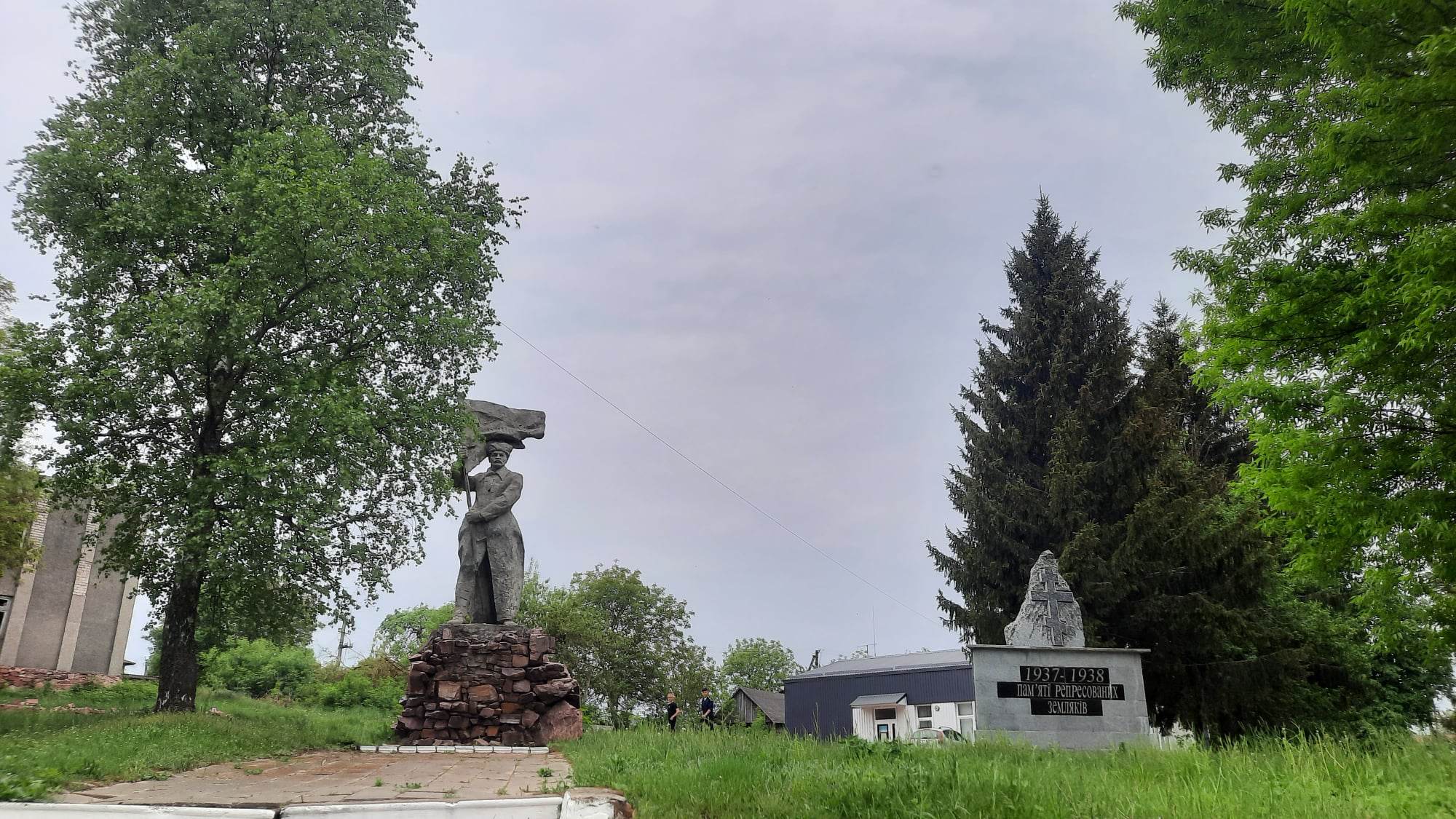
This is what the village center looked like until recently: monuments to executioners and their victims stood side by side.
I ask about the villagers’ reaction. “Most of them were understanding and supportive,” says Yuliya Davydiuk. “In several cases, people would call me and say: ‘You didn't put up this monument, and you shouldn't be the one to take it down. Do you even know whom this monument depicts?’” They did not know the answer themselves.”
But the dialog with the community did work. Yuliya found a way to convince people with the help of documentary films. “In the DOCU/CLUB Network's film library, there is the film ‘The Lord’ by Georgian director Shalva Shengelia. It tells the story of a monument to Stalin that stood on the territory of an ancient monastery and of the conflict this caused in the village. The situation was similar to ours,” the moderator recalls. “I gathered the community for a screening of the film, and then we discussed historical memory and restoration of historical justice. Eventually, we unanimously decided to demolish the Soviet monument.
The dismantling of the monument began at 7 am. Poor employees of our village council even hit it with hammers, but the cement filling was too strong! While sawing it, they broke two cables. And then one desperate driver came and said: ‘I'll take it down anyway, even without the cables, we'll do it now.’ And he succeeded,” says the film club moderator.
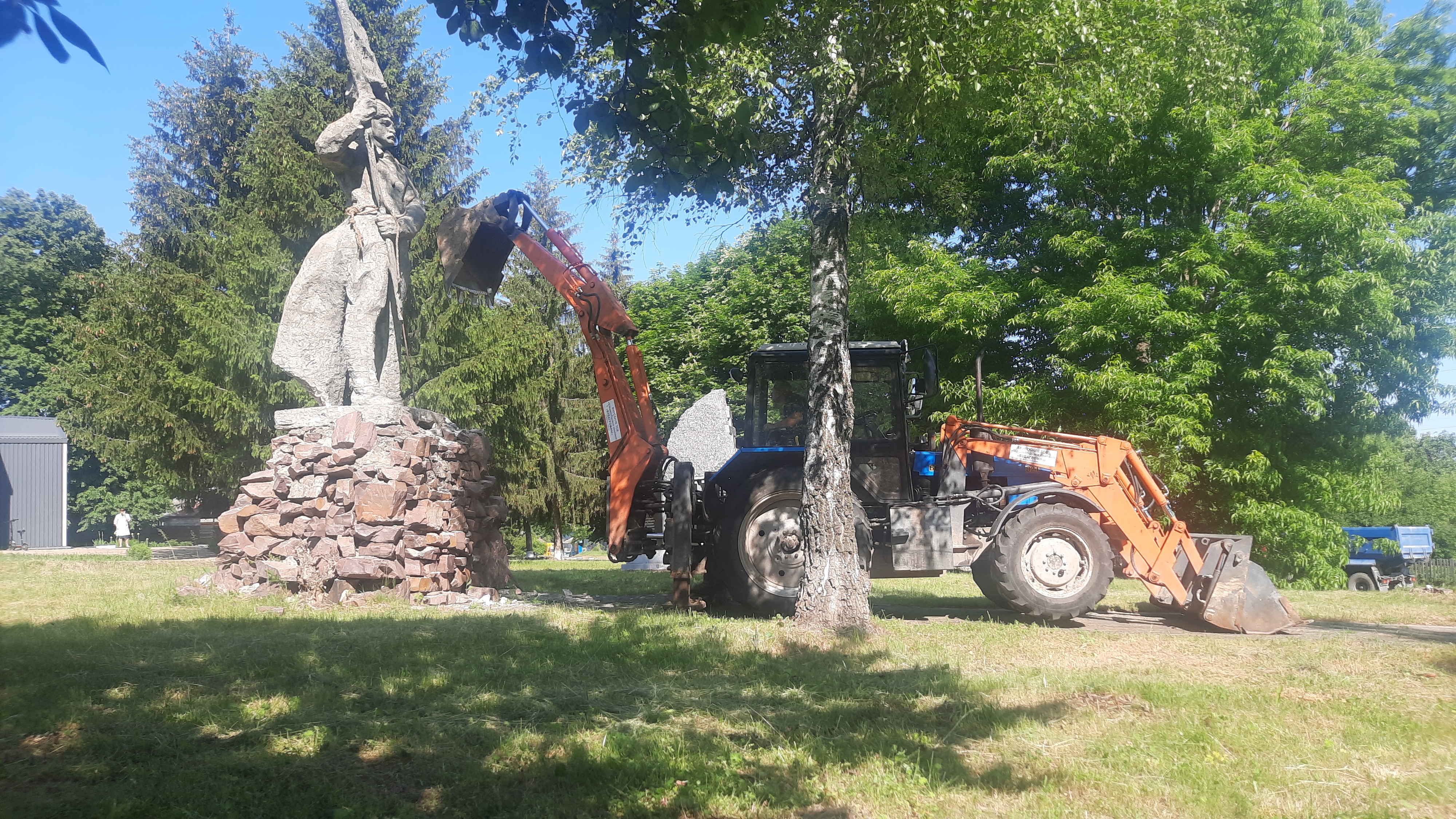
The moment of the “first Bolsheviks” monument demolition
Yulyia Davydiuk is a local deputy, so I can't help but ask her why she needs a film club to implement her ideas. “Because it brings people together,” she assures me. "When you find like-minded people in the community, when people understand the problem, it's easier to solve it. I need to communicate with people, so that we can find different ways to solve our problems.”
It all started by chance
“I accidentally saw on Facebook that there was an opportunity to join the DOCU ACTION 2.0 program by the DOCU/CLUB Network. I filled out an application to start a film club and started learning how to organize film screenings and discussions. For several months, the program's mentors and experts shared their experience with us, explaining how to talk about human rights. The experience I gained was invaluable,” recalls Yuliya Davydiuk, moderator of the Docudays UA Film Club at the Pokaliv Lyceum.
She is one of those “magnetic” people who gather both adults and children around them. “I don't even know how to discuss some painful issues, how to talk about human rights and how to explain them to our children and adults without films. When you just talk about bullying, it's one thing, but when you show the documentary ‘Bully’ to children, they feel the pain of others and understand what not to do. I am amazed by the conclusions that children draw after watching the films,” the moderator admits.
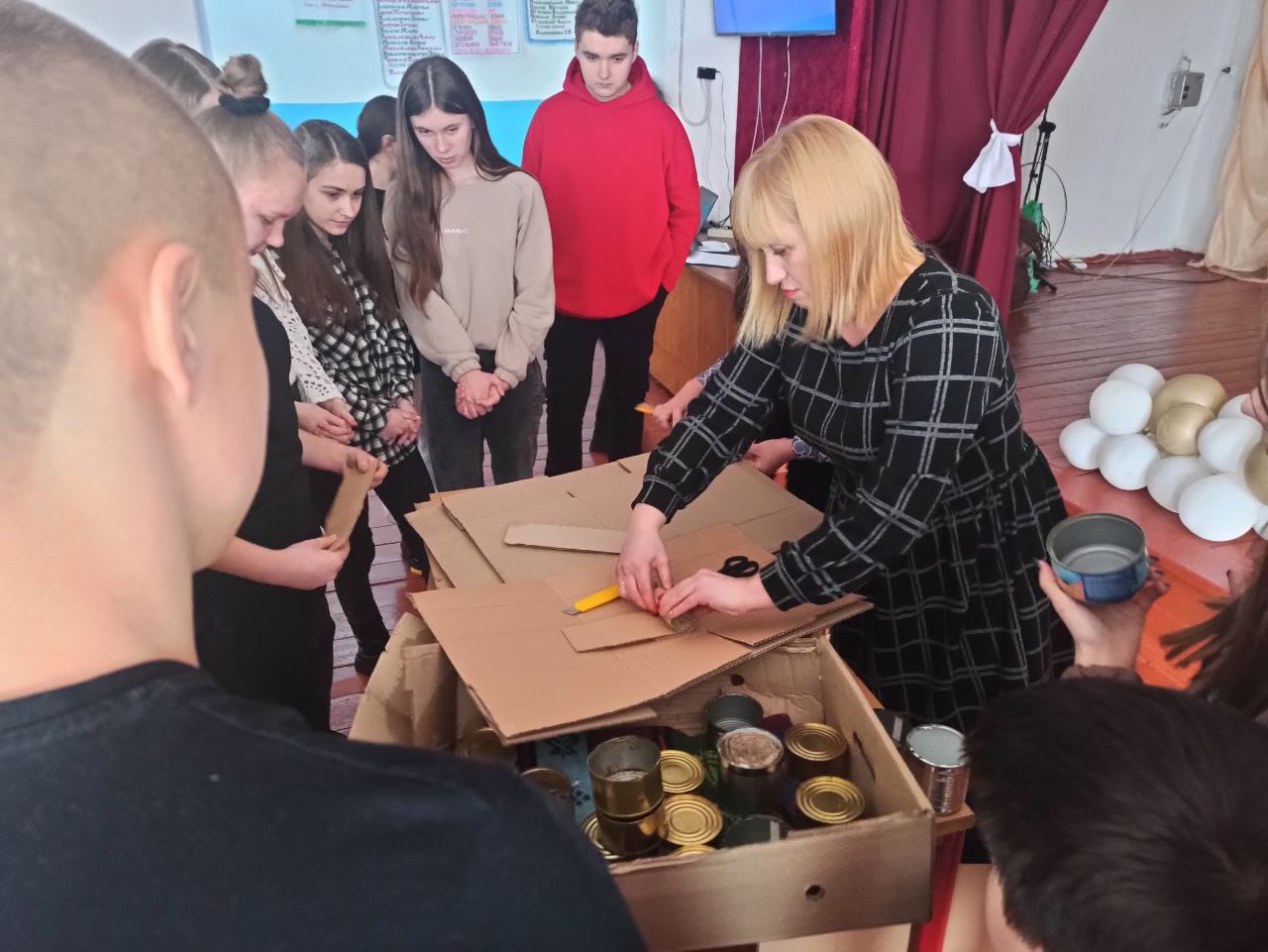
After a screening for schoolchildren
Her film club has become a real cultural center in the community, and its influence has already gone far beyond Pokaliv. The moderator organizes on-site screenings in Ovruch: at the central library, at the Sunday school, and in the hub. In January, she plans to start screenings in neighboring communities as well. Many applications came from Slovechne. “For instance, some of the visitors of the cinema club had seen the film ‘Voiceless,’ and others asked whether we could show it to them as well. They called on Volunteer Day, saying, ‘Can you show us this film?’ Of course, we can, and we can show more than one, because we actually have a large collection of films,” emphasizes Yuliya Davydiuk.
The moderator's native Pokaliv Lyceum, which hosts the film club, has students from 16 settlements in the district. Some of them are located just three kilometers from the Belarusian border, so children have to travel to school from far away. The lyceum conducts on-site lessons, and in case of danger, students go down to the bomb shelter. Yuliya Davydiuk often holds film club meetings there.
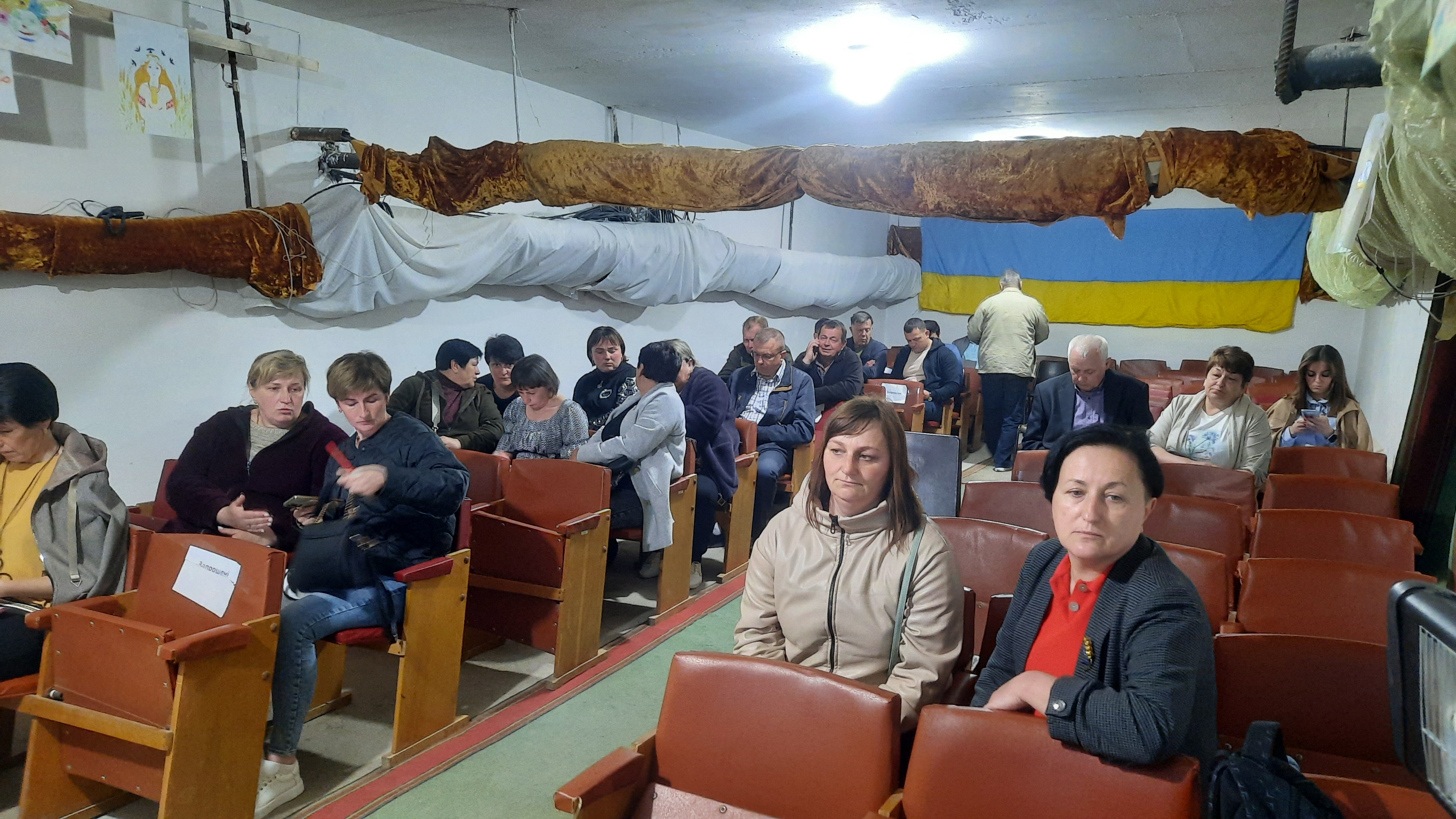
Film screening in the bomb shelter
Heroes do not die as long as their memory lives on
It was during these meetings that the idea for the advocacy project “We Will Not Forget and We Will Not Forgive,” which the film club implemented as part of the DOCU ACTS 2.0 program, came about. Yuliya Davydiuk and her like-minded colleagues noted that the Ovruch community does not have a comprehensive approach to preservation of the memory of the Defenders of Ukraine. “Since the beginning of the war, many of our fellow countrymen have sacrificed their lives. Memorial plaques were installed on the walls of the schools they graduated from – some of them have up to 15 memorial plaques. Schools turned into memorials. This is a source of trauma for the children of the fallen heroes who study there. Besides, where should we install the plaques for those who did not study in the schools but lived in these settlements? Over time, memorial plaques began to appear on paramedic and obstetric stations, village clubs, and village councils. We decided to rethink the problem, to find some other way out of the situation and to arrange a common space of memory,” says Yuliya Davydiuk.
Once again, documentary cinema helped. The community members watched the film “Tales of a Toy Horse” by Ulyana Osovska and Denys Strashnyy and, during the discussion, formed a common opinion on creating a place of memory. The memorial in the center of the village should become such a place, the community decided. “We started discussions with the families of the victims, and even looked at how memorials are organized in other cities. But there are many issues that we have not yet resolved. The number of villagers killed during the full-scale war is growing. When the memorial exhibition was opened, there were only five of them, and now there are seven, unfortunately,” Yuliya Davydiuk shares her painful experience.
According to the current legislation, in order to create a memorial, it is necessary to go through the procedure of allocating a land plot. This cannot be done quickly, but the work has begun. Community members joined the advocacy project and developed a roadmap for the creation and arrangement of a place of remembrance in Pokaliv, which has already been approved by the Ovruch City Council. Meanwhile, in June, the exhibition “Heroes Do Not Die as Long as Their Memory Lives” was opened in the center of the village on the site of the dismantled monument.
Due to the cinema club, Pokaliv has already created a temporary space of remembrance for the heroes of the ongoing struggle for Ukraine. The community plans to continue working to fully organize a permanent place of remembrance and create a memorial. And Yuliya Davydiuk believes that successful communication with the local authorities and the support of the community will help them achieve their goals.
The development of the DOCU/CLUB Network is funded by the United States Agency for International Development (USAID), the Embassy of Sweden in Ukraine, the National Endowment for Democracy (NED) and the Fondation de France.
The opinions, conclusions, or recommendations are those of the authors and compilers of this publication and do not necessarily reflect the views of the governments or charitable organizations of these countries. The authors and compilers are solely responsible for the content of this publication.
All news



